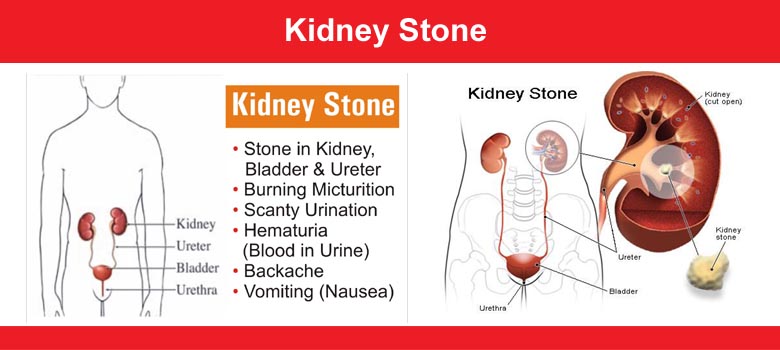
A kidney stone is a small stone, usually made up of calcium crystals, that forms inside the part of the kidney where urine collects. The stone usually causes little problem until it falls into the ureter, the tube that drains the kidney into the bladder, and causes an obstruction, preventing urine from draining out of the kidney and often causing severe pain.
Causes of kidney stones
Intake of too much calcium rich food, or other sources can contribute to formation of the stones. An illness called gout might cause kidney stone, as can a blockage of urine or large amount of calcium in the urine.Kidney stones form when there is a decrease in urine volume or an excess of stone-forming substances in the urine. The most common type of kidney stone contains calcium in combination with either oxalate or phosphate. Other chemical compounds that can form stones in the urinary tract include uric acid and the amino acid cystine. Obstruction to the flow of urine can also lead to stone formation. Kidney stones can also result from infection in the urinary tract; these are known as struvite or infection stones.Men are especially likely to develop kidney stones. The prevalence of kidney stones begins to rise when men reach their 40s, and it continues to climb into their 70s. People who have already had more than one kidney stone are prone to develop more stones. A family history of kidney stones is also a risk factor for the development of kidney stones.
Symptoms of kidney stones
In some cases, a kidney stone lies in a kidney and causes no problems or symptoms. You may not be aware that a stone has formed. If symptoms do occur, they include one or more of the following-
- Pain from a kidney - A stone that is stuck in a kidney may cause pain in the side of the abdomen.
- Renal colic - This is a severe pain which comes and goes and is caused by a stone that passes into the ureter . The stone becomes stuck. The ureter squeezes the stone towards the bladder, which causes intense pain in the side of your abdomen. The pain may spread down into the lower abdomen . You may sweat or feel sick due to the pain.
- Blood - Blood may be seen in urine (urine turns red) caused by a stone rubbing against the inside ureter.
- Infection - Urine infections are more common in people with kidney stones. Infections can cause fever, pain on passing urine and increased frequency of passing urine.
- Nausea.
- Painful burning urination.
Diet for Kidney Stones
- Fluid Intake Increase your fluid intake to the point where your urine volume reaches 2.5 litres a day. This may mean drinking up to 3 litres a day. Increasing urine volume decreases the concentration of minerals in the urine. This makes it less likely that a stone will form.
- Calcium intake Make sure your diet includes the recommended Daily Allowance of calcium. Note that your calcium intake should be greatest at mealtimes. This helps to ensure that ingested minerals such as oxalate bind with calcium during digestion and pass out of the body through the intestines, rather than passing into the bloodstream and then binding with calcium in the kidneys.
Kidney stone Treatment
The Doctors of Astha Clinic have made an effective combination of herbal & Homeopathic Medicines for the treatment of Kidney stone.
These medicines breaks stones into very tiny pieces which easily comes outside through urine. Medicines immmidiately relieves burning and painful micturation.
It is advised that the patient must drink at least 8 to 10 glasses of water everyday. This helps flush the stone through the urniary tract and will also help prevent other stone from forming.
It is advisable that you strain your urine through a special strainer or through a piece of thin cloth everytime when you go to the bathroom so that you can catch the stone when it passes through your bladder. You may find it easier to urinate into a glass jar; when the stone passes, you'll be able to see it at the bottom of the jar. Save the stone and take it to your doctor for analysis.
Seek care immidiately to your doctor if you have severe pain, nausea, high temperature.






